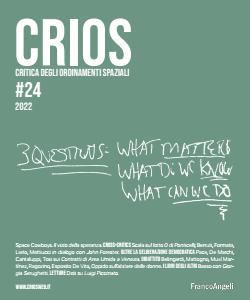Issue 26/2023 Rifiutiamoli
Editoriale
Cross-Critics
Dibattito: paesaggi, fantasmi e forme di resistenza nella valle del sacco. Una scorribanda nell'italia di mezzo
- Enrico Formato, Ludovica Battista, Paesaggi, fantasmi e forme di resistenza nella Valle del Sacco. Una scorribanda nell'italia di mezzo (Removals, representations, thresholds)
- Ludovica Battista, Sulle tracce di una «cosa viva» (On the trail of a «living thing»)
- Luisa Fatigati, Vulnerabilità trasformative e risonanza ecosistemica (Transformative vulnerabilities and ecosystem resonance)
- Nicola Fierro, Geografie intermedie e spazi di margine (Intermediate geographies and margin spaces)
- Vincenzo Gioffré, Da paesaggio rurale ancestrale a “terzo paesaggio” post-industriale (From ancestral rural landscape to post-industrial “third landscape”)
- Cristina Mattiucci, Istantanee: sovrapposizioni e intersezioni tra processi di natura interscalare
- Clara Maseda Juan, “Presente in continuo cambiamento” della Valle del Sacco: azioni ed evocazioni illustrate (Sacco Valley's “Ever-Changing Present”: Illustrated Actions and Evocations)
Oltre la sostenibilità
- Maria Simioli, Spazi-risorsa e circolarità per l'area costiera ad est di Napoli (Resource-Spaces and Circularity along the Eastern Coastal Area of Naples)
- Michelangelo Russo, Paesaggi, tempi e geografie della transizione (Landscapes, Times and Geographies of Transition)
